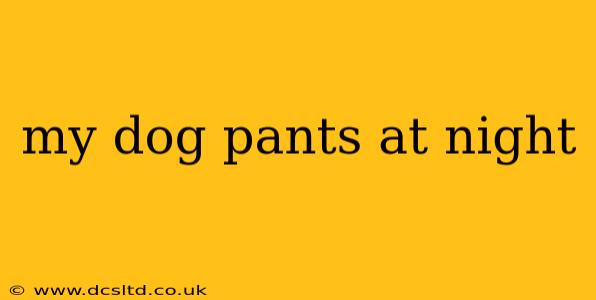Many dog owners find themselves wondering, "Why does my dog pant at night?" While panting is a normal canine function for regulating body temperature, nighttime panting can sometimes indicate underlying health concerns. This comprehensive guide will explore the common reasons behind nighttime panting in dogs, helping you determine when it's a cause for concern and when it's simply a harmless habit.
Common Reasons Why Dogs Pant at Night
Several factors can contribute to a dog panting excessively at night. Let's delve into the most frequent causes:
1. Warm Temperatures: Even in seemingly cool rooms, your dog's body temperature might remain elevated, leading to panting as a cooling mechanism. This is especially true for brachycephalic breeds (dogs with short noses like Bulldogs and Pugs) who are more prone to overheating.
2. Anxiety and Stress: Just like humans, dogs can experience anxiety and stress that manifest physically as panting. Separation anxiety, fear of thunderstorms, or even a change in routine can trigger nighttime panting.
3. Pain or Discomfort: Underlying medical conditions like arthritis, hip dysplasia, or other forms of pain can cause discomfort that leads to increased panting, particularly at night when they are resting.
4. Excitement or Energy Levels: If your dog has been particularly active during the day, they might still be exhibiting residual energy at night, resulting in panting.
5. Underlying Medical Conditions: More serious conditions such as heart disease, respiratory problems, or even certain types of cancers can cause increased panting. This is especially concerning if the panting is accompanied by other symptoms.
When Should I Worry About My Dog Panting at Night?
While occasional nighttime panting is often nothing to worry about, persistent or excessive panting warrants veterinary attention. Consider seeking professional help if you notice:
- Excessive Panting: Panting that is significantly more pronounced than usual, even after ruling out environmental factors.
- Accompanying Symptoms: If the panting is coupled with other symptoms like lethargy, vomiting, diarrhea, coughing, difficulty breathing, or changes in urination or defecation.
- Sudden Onset: The sudden onset of excessive panting that wasn't present before.
- Breed Predisposition: Brachycephalic breeds should be monitored closely for overheating, as they pant more readily.
How Can I Help My Dog Stop Panting at Night?
Addressing the underlying cause is key. If your dog's panting is due to environmental factors, try:
- Cooling Strategies: Ensure proper ventilation, use fans, or consider air conditioning, particularly in warmer climates.
- Comfortable Bedding: Provide a comfortable and cool sleeping area.
- Reduce Excitement: Minimize stimulating activities before bedtime.
If anxiety is a factor, consider:
- Calming Aids: Consult your veterinarian about pheromone diffusers, calming supplements, or other anxiety-reducing strategies.
- Consistent Routine: Maintaining a consistent sleep schedule can help reduce anxiety.
For pain-related panting:
- Veterinary Consultation: A thorough veterinary examination is essential to diagnose and treat the underlying pain source.
Remember: This information is for general knowledge and does not replace professional veterinary advice. If you have concerns about your dog's nighttime panting, consult your veterinarian for an accurate diagnosis and tailored treatment plan. They can help determine the root cause and recommend appropriate solutions.
